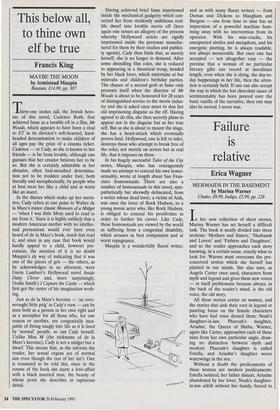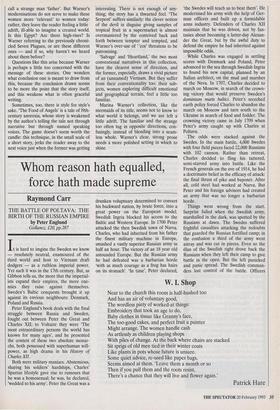Failure is relative
Erica Wagner
MERMAIDS IN THE BASEMENT by Marina Warner Chatto, f9.99, Indigo, L5.99, pp. 228 In her new collection of short stories, Marina Warner has set herself a difficult task. The book is neatly divided into three sections: 'Mothers and Sisters,' Husbands and Lovers' and 'Fathers and Daughters', and so the reader approaches each story knowing, in a certain sense, exactly what to look for. Warner must overcome the pre- conceived notion which she herself has planted in our minds. She also uses, as Angela Carter once used, characters from myth and legend and gives them new voices — in itself problematic because always, in the back of the reader's mind, is the old voice, the old story.
All these stories centre on women, and the stories that sink their root in legend or painting focus on the female characters who have had voice denied them: Noah's daughter-in-law, Pharoah's daughter, Ariadne, the Queen of Sheba. Warner, again like Carter, approaches each of these tales from her own particular angle, draw- ing no distinction between myth and modern: Pharoah's daughter is called Estella, and Ariadne's daughter wears waterwings in the sea.
Without a doubt the predicaments of these women are modern predicaments: Estella isolated, her father distant, Ariadne abandoned by her lover, Noah's daughter- in-law adrift without her family, forced to call a strange man 'father'. But Warner's modernisations do not serve to make these women more 'relevant' to women today: rather, they leave the reader feeling a little adrift, ill-able to imagine a created world. Is this Egypt? Are there high-rises? Is Warner referring to the previously chroni- cled Seven Plagues, or are these different ones — and if so, why haven't we heard about them before?
Questions like this arise because Warner is perhaps a little too concerned with the message of these stories. One wonders what conclusion one is meant to draw from this, because the conclusion drawn seems to be more the point that the story itself, and this weakens what is often graceful writing.
Sometimes, too, there is style for style's sake. 'The Food of Angels' is a tale of 19th- century anorexia, whose story is weakened by the author's telling the tale not through narrative but through named speaking voices. The game doesn't seem worth the candle: this technique, in the small scale of a short story, jerks the reader away to the next voice just when the former was getting interesting. There is not enough of any- thing; the story has a thwarted feel. 'The Serpent' suffers similarly: the clever notion of the devil in disguise giving samples of tropical fruit in a supermarket is almost overmastered by the contrived back and forth between tempter and tempted, and Warner's over-use of "cos' threatens to be patronising.
`Salvage' and 'Heartland,' the two most conventional narratives in this collection, have the clearest sense of direction, and the former, especially, draws a vivid picture of an (unnamed) Vietnam. But they suffer from their conventionality too: their sub- jects, women exploring difficult emotional and geographical terrain, feel a little too familiar.
Marina Warner's collection, like the mermaids of its title, seems not to know to what world it belongs, and we are left a little adrift. The familiar and the strange too often tug in opposite directions, con- fusingly, instead of blending into a seam- less whole. Warner's clear, strong prose needs a more polished setting in which to shine.



























































 Previous page
Previous page